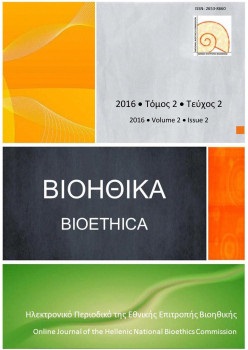Aspects of the contribution of Church of Greece and Orthodox Theology in the development of bioethical dialogue

Abstract
The Commission has dealt extensively with major ethical issues, such as the moment of death, the mechanical support in ER, the interfering with the normal process of reproduction, the beginning of the human life, the problem of euthanasia, the challenge of man’s intervention in the human genome, creating designer babies, the research and the experimentation on humans, especially on the fetus, the dependence of health on monetary profit, the use of medical technology on humans, thus contributing to the Orthodox Christian Ethics, and the total scientific dialogue.
The Church assesses the bioethical issues above, and, through its theological tradition and life, formulates its pastoral advice and guidance hence focusing on vital issues such as the ethical limits in biomedical applications and the criteria that can set them. The Orthodox Bioethics is called to give answers to dilemmas which the biomedical sciences fail to do so or even lead to a deadlock.
Article Details
- How to Cite
-
Χανιώτης (Evangelos Chaniotis) Ε. (2016). Aspects of the contribution of Church of Greece and Orthodox Theology in the development of bioethical dialogue. Bioethica, 2(2), 69–82. https://doi.org/10.12681/bioeth.19782
- Section
- Reviews
Authors who publish with this journal agree to the following terms:
- Authors retain copyright and grant the journal right of first publication with the work simultaneously licensed under a Creative Commons Attribution CC BY 4.0 License, which allows for immediate free access to the work and permits any user to read, download, copy, distribute, print, search, or link to the full texts of articles, crawl them for indexing, pass them as data to software, or use them for any other lawful purpose. Appropriate credit must be given by citing the author(s) and the original publication in this journal.
- Authors are able to enter into separate, additional contractual arrangements for the non-exclusive distribution of the journal's published version of the work (e.g. post it to an institutional repository or publish it in a book), with an acknowledgement of its initial publication in this journal.
We encourage authors to deposit their articles, as well as data underlying the publications, in institutional and/or other appropriate subject repositories.
Bioethica permits and encourages authors to archive the final publication pdf in institutional (e.g. the repository of the National Hellenic Research Foundation) or other appropriate subject repositories (e.g. SSOAR repository for social sciences), in compliance with institutional and/or funder open access policies, after publication in the BIOETHICA. Authors must provide bibliographic details that credit publication in the journal, as well as related funding details (when applicable).
Lists of institutional and other subject-based academic open access repositories can be found listed by country at the registry http://opendoar.org/countrylist.php
If your institution does not possess a repository you may deposit a copy of your paper at no cost with www.zenodo.org , the repository supported for open access research in the EU by the European Commission, through the project OpenAIRE (www.openaire.eu )


